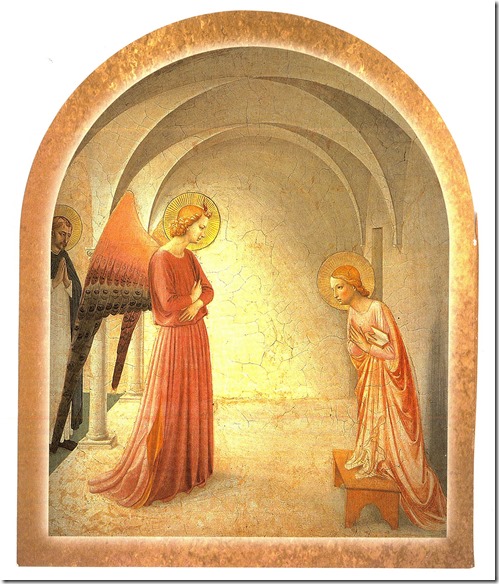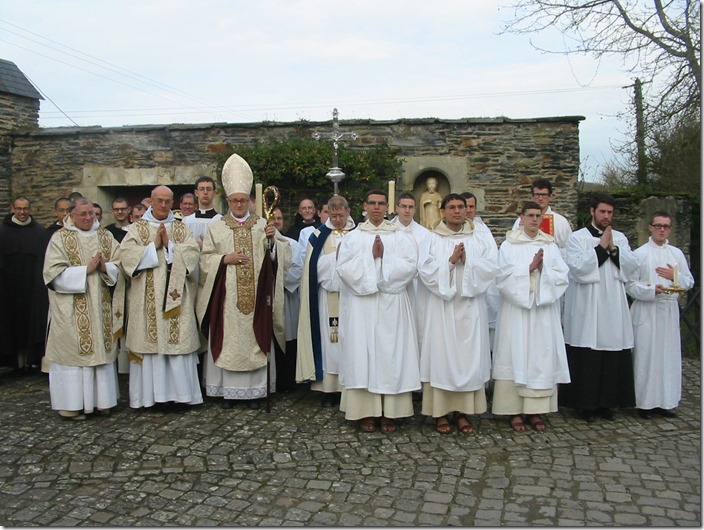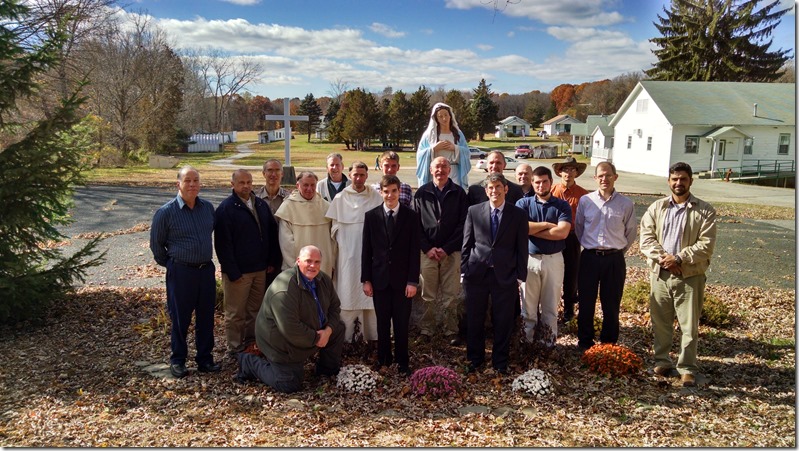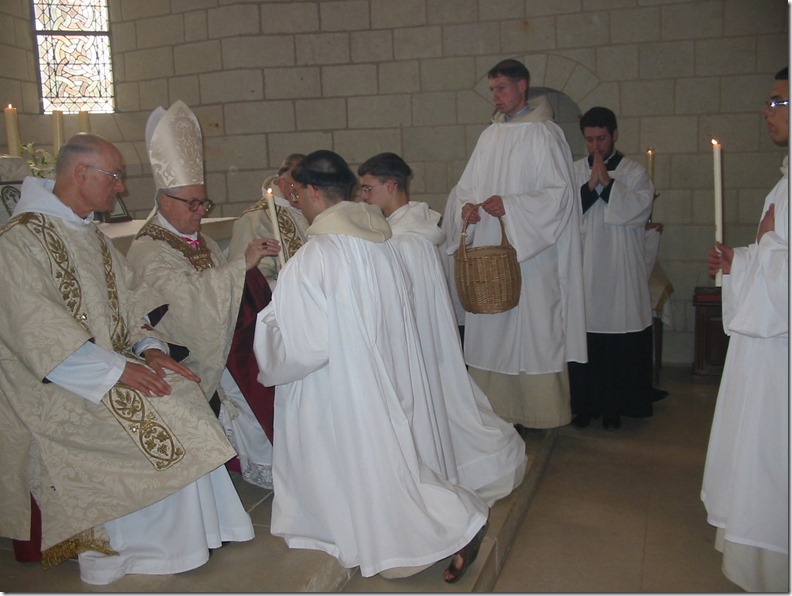 |
|
The Resurrection by Fra Angelico |
A simple method to pray the Rosary without distractions (continued): the Glorious Mysteries
The Rosary is an admirable means of personal sanctification, but it is also a powerful weapon again the enemies of God and His Church. From the defeat of the Cathars at the battle of Muret to the great victories (without a shot being fired!) against communism in Austria and Brazil in the 20th Century, and passing through the victories of Lepanto and Vienna against the Turks, and those against the Protestants in La Rochelle, the Most Holy Virgin has never abandoned Catholics when they have turned to her through her holy Rosary. However, this ancient struggle between the “lineage of the serpent and the lineage of the woman” is renewed with each generation.
This struggle is perhaps nowhere more manifest at this time than in the past. Although it is not the objective of the Confraternity to convey prayer intentions to the members, how can we keep quiet in the face of the drama that is now unfolding for our Catholic brothers being persecuted in Syria, Iraq and Egypt, as well as in China, Nigeria, India and elsewhere? Through the Rosary, let us pray for the conversion of the Muslims, Jews, Protestants, communists, freemasons, and all those who are behind these persecutions. Let us especially pray that the persecuted Catholics keep the faith and publicly profess it, even, if need be, at the price of their life. We can hope that a host of these chosen souls have received the grace of martyrdom, are already in heaven tasting the delights of paradise, and that we whom they have left behind in this valley of tears, can join with them by meditating on the Glorious Mysteries, after having considered the Joyous and Sorrowful Mysteries.
(Remember: read one sentence before each “Hail Mary.”)
THE RESURRECTION
1. Upon His death, Jesus’ soul descends into limbo to the joy of the just of the Old Testament.
2. His lifeless body remains in the tomb, always united to the divinity, without the least corruption.
3. On Easter morning, Jesus’ soul reunites with His body, never to be separated from it again.
4. His body, brilliant with light, imprints a mysterious image on the holy shroud.
5. At the same time, the earth is shaken and an angel rolls away the great stone that closed the tomb.
6. Jesus leaves the tomb in all His glory and appears to the Roman soldiers, who are terrified.
7. Jesus goes to visit the Blessed Virgin to announce His Resurrection to her.
8. The Blessed Virgin is filled with joy, but is by no means surprised, nor troubled; she had been waiting for this moment since Good Friday.
9. Jesus appears to St. Mary Magdalene and tells her, “do not touch me” to test her too sentimental love.
10. Jesus appears several times to the Apostles and the disciples, but some are slow to believe.
THE ASCENSION
1. At Jesus’ resurrection, many of the dead leave their tombs and roam around the city of Jerusalem.
2. During the forty days, they visit their families to proclaim to them that Jesus is the Messiah announced by the prophets.
3. Jesus appears only to His Apostles and disciples.
4. Jesus “opens the minds” of His Apostles so that, little by little, they come to understand Holy Scripture.
5. A little before ascending to heaven, Jesus orders His Apostles to “teach ye all nations; baptizing them in the name of the Father, and of the Son, and of the Holy Ghost. Teaching them to observe all things whatsoever I have commanded you.” (Matt. 28:19-20)
6. The nations must render public honor to Our Lord Jesus Christ, and all of society’s laws must be in harmony with His teachings.
7. Jesus appears one last time in Jerusalem and eats with His Apostles.
8. He promises to send them the Holy Ghost.
9. He leads them to the Mount of Olives.
10. Jesus raises His hands and blesses His Apostles, all while moving away from them up to heaven.
PENTECOST
1. The Apostles are distraught.
2. Everyone returns to the Cenacle to pray and wait for the Holy Ghost.
3. The Apostles, the disciples and the holy women number about 120 persons.
4. Matthias is elected to replace the traitor Judas.
5. St. Peter says Mass each day. All receive communion and passes the day in prayer.
6. During this time, an innumerable crowd of Jews from throughout the world is assembling in the city to celebrate the feast of the Jewish Pentecost.
7. Suddenly, accompanied by the sound of trumpets, a violent wind opens the windows of the Cenacle.
8. Tongues of fire descend upon the heads of the Apostles, and, in the blink of an eye, they understand all of Jesus’ teachings.
9. Immediately they descend into the street to announce to the crowd the forgiveness of their sins, upon the condition of doing penance and being baptized.
10. Around 3,000 people ask to be baptized.
THE ASSUMPTION
1. Each day more and more people ask for baptism so as to be saved, but the jealous Jews try to exterminate the Christians.
2. St. Stephen, St. James the Lesser and many others are killed in hatred of the faith.
3. Mary supports the nascent Church through her prayers.
4. St. Luke questions the Blessed Virgin on the details of Jesus’ infancy.
5. The Blessed Virgin receives daily communion at St. John’s Masses.
6. She appears to St. James the Greater in Spain to encourage him.
7. She enlightens and encourages all those who come to see her at St. John’s home.
8. She so ardently desires to be with her divine Son, that her body can no longer retain her soul.
9. Her soul and her body separate, but her body suffers no trace of corruption.
10. A little afterward, her body rejoins her soul and the Blessed Virgin is assumed entirely into heaven.
THE CORONATION OF THE BLESSED VIRGIN
1. At the moment of her Immaculate Conception, the Blessed Virgin exceeded in grace all the angels and saints combined.
2. During each moment of her existence, she made an act of love which multiplied in an extraordinary way the degree of grace in her soul.
3. Thus, at the moment of her entry into heaven, the Blessed Virgin was raised in glory higher than one can imagine.
4. Her glory is quasi-infinite; she touches the “confines of the divinity.”
5. Our Lord places a mysterious crown on the head of His Blessed Mother.
6. This crown symbolizes the total power with which the Blessed Virgin is invested from that point on.
7. Jesus proclaims the Blessed Virgin, “Queen of Heaven and Earth.”
8. All the angels and saints acclaim her as their queen and mistress.
9. Jesus desires that all the graces that we receive pass through Mary’s hands.
10. Mary now distributes all the graces that she has merited with and through Jesus at the foot of the Cross.







